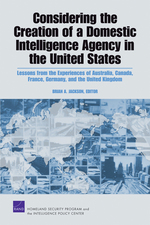Considering the Creation of a Domestic Intelligence Agency in the United States
Lessons from the Experiences of Australia, Canada, France, Germany, and the United Kingdom

Download Url(s)
https://www.jstor.org/stable/10.7249/MG805DHSAuthor(s)
Jackson, Brian A.
Marcum, Cheryl Y.
Robbert, Albert A.
Riddile, Andrew
Language
EnglishAbstract
With terrorism still prominent on the U.S. agenda, whether the country's prevention efforts match the threat the United States faces continues to be central in policy debate. One element of this debate is questioning whether the United States should create a dedicated domestic intelligence agency. Case studies of five other democracies--Australia, Canada, France, Germany, and the UK--provide lessons and common themes that may help policymakers decide. The authors find that* most of the five countries separate the agency that conducts domestic intelligence gathering from any arrest and detention powers* each country has instituted some measure of external oversight over its domestic intelligence agency* liaison with other international, foreign, state, and local agencies helps ensure the best sharing of information* the boundary between domestic and international intelligence activities may be blurring.
Keywords
Political ScienceDOI
10.7249/MG805DHSISBN
9780833048233, 9780833046178Publisher
RAND CorporationPublication date and place
2009Classification
International relations
Terrorism, armed struggle
